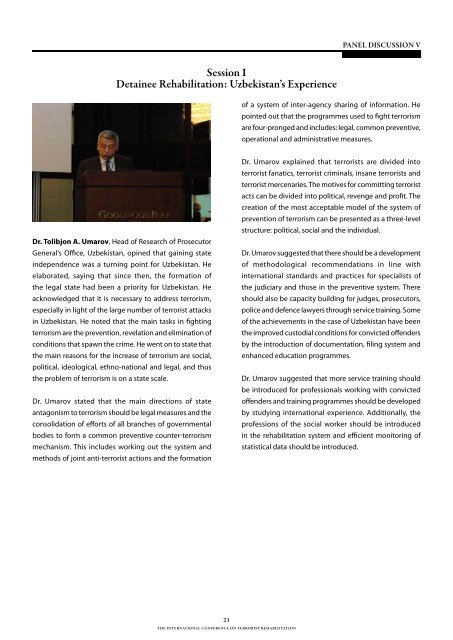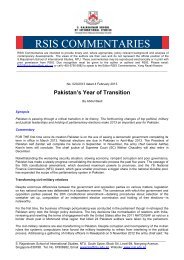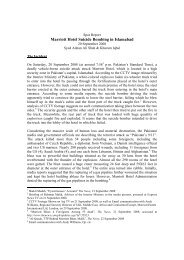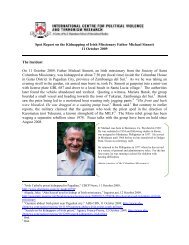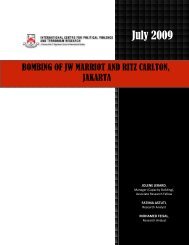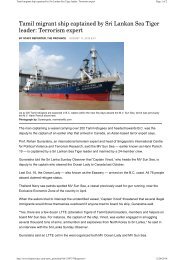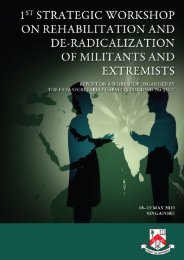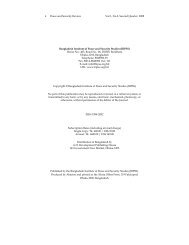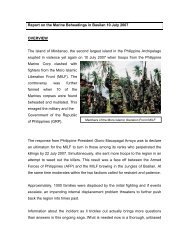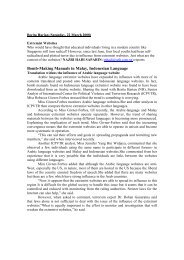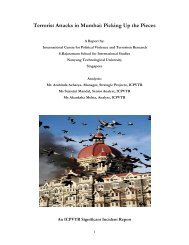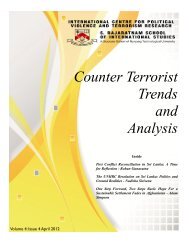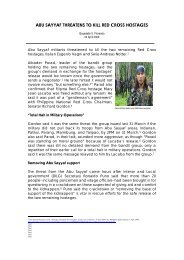International Conference On Terrorist Rehabilitation
International Conference On Terrorist Rehabilitation
International Conference On Terrorist Rehabilitation
Create successful ePaper yourself
Turn your PDF publications into a flip-book with our unique Google optimized e-Paper software.
PANEL DISCUSSION V<br />
Session I<br />
Detainee <strong>Rehabilitation</strong>: Uzbekistan’s Experience<br />
of a system of inter-agency sharing of information. He<br />
pointed out that the programmes used to fight terrorism<br />
are four-pronged and includes: legal, common preventive,<br />
operational and administrative measures.<br />
Dr. Tolibjon A. Umarov, Head of Research of Prosecutor<br />
General’s Office, Uzbekistan, opined that gaining state<br />
independence was a turning point for Uzbekistan. He<br />
elaborated, saying that since then, the formation of<br />
the legal state had been a priority for Uzbekistan. He<br />
acknowledged that it is necessary to address terrorism,<br />
especially in light of the large number of terrorist attacks<br />
in Uzbekistan. He noted that the main tasks in fighting<br />
terrorism are the prevention, revelation and elimination of<br />
conditions that spawn the crime. He went on to state that<br />
the main reasons for the increase of terrorism are social,<br />
political, ideological, ethno-national and legal, and thus<br />
the problem of terrorism is on a state scale.<br />
Dr. Umarov stated that the main directions of state<br />
antagonism to terrorism should be legal measures and the<br />
consolidation of efforts of all branches of governmental<br />
bodies to form a common preventive counter-terrorism<br />
mechanism. This includes working out the system and<br />
methods of joint anti-terrorist actions and the formation<br />
Dr. Umarov explained that terrorists are divided into<br />
terrorist fanatics, terrorist criminals, insane terrorists and<br />
terrorist mercenaries. The motives for committing terrorist<br />
acts can be divided into political, revenge and profit. The<br />
creation of the most acceptable model of the system of<br />
prevention of terrorism can be presented as a three-level<br />
structure: political, social and the individual.<br />
Dr. Umarov suggested that there should be a development<br />
of methodological recommendations in line with<br />
international standards and practices for specialists of<br />
the judiciary and those in the preventive system. There<br />
should also be capacity building for judges, prosecutors,<br />
police and defence lawyers through service training. Some<br />
of the achievements in the case of Uzbekistan have been<br />
the improved custodial conditions for convicted offenders<br />
by the introduction of documentation, filing system and<br />
enhanced education programmes.<br />
Dr. Umarov suggested that more service training should<br />
be introduced for professionals working with convicted<br />
offenders and training programmes should be developed<br />
by studying international experience. Additionally, the<br />
professions of the social worker should be introduced<br />
in the rehabilitation system and efficient monitoring of<br />
statistical data should be introduced.<br />
21<br />
THE INTERNATIONAL CONFERENCE ON TERRORIST REHABILITATION


